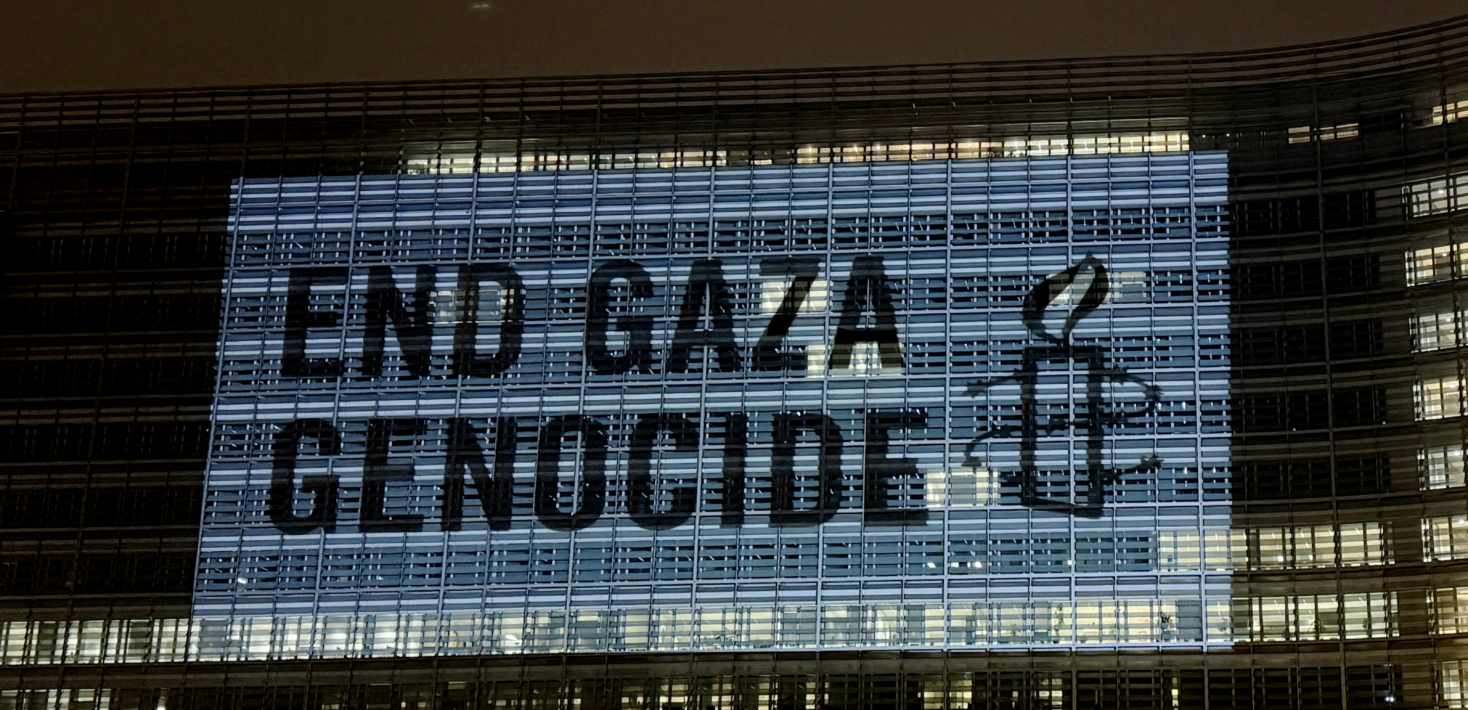Ursula von der Leyen knows that the EU’s reputation as a credible actor for human rights and international law is in tatters over the horrors in Gaza.
EU leaders and officials have gone from privately condemning the EU’s double standards behind closed doors to publicly lamenting them. Instead of tackling these double standards however, the European Commission President rebranded them as “anti-EU narratives” and tasked the new Commissioner for the Mediterranean and foreign policy chief to elaborate a communications strategy to highlight the EU’s contribution to the region. But there are issues that even the canniest communications strategy cannot bury.
After the atrocities committed by Hamas and other armed groups on 7 October 2023, Israel’s military campaign has killed over 45,000 Palestinians, 60% of whom are children, women and older people. The Israeli offensive has left the occupied Gaza Strip a wasteland, inflicting shocking and unprecedented levels of death, suffering and destruction. Amnesty International investigated Israel’s offensive on Gaza, examining a variety of unlawful acts constituting a pattern of conduct, the harmful and destructive impact of its policies and actions, and Israeli government and military officials’ racist, dehumanizing and genocidal rhetoric.
The conclusion is clear: Israel is committing these acts with the intent to destroy the Palestinians in Gaza. Israel is committing genocide. We also found that not only is the genocide in Gaza the most documented in history, but the EU and many of its member states are failing to prevent it. Moreover, some member states risk becoming complicit in Israel’s genocide by continuing to transfer arms to the country.
‘All signs of genocide are flashing red’
Amnesty International’s report ‘You Feel Like You Are Subhuman’: Israel’s Genocide Against Palestinians in Gaza is the culmination of nine months of meticulous research and spans 296 pages. During our investigation, we interviewed 212 people, conducted extensive fieldwork and analyzed a wide range of visual and digital evidence, including satellite imagery. Crucially, we also analyzed evidence of Israel’s intent, before concluding that Israel has committed — and is continuing to commit — genocide in Gaza.
In 15 airstrikes we found that Israel killed 334 civilians, including 141 children, and wounded hundreds of others in direct attacks against civilians and without effective warnings. These airstrikes represent a subset of a wider pattern of deliberately indiscriminate attacks. We also documented how Israel has deliberately imposed conditions of life on Palestinians in Gaza calculated to bring about their physical destruction. Within the context of Israel’s long-standing apartheid and unlawful occupation, the inescapable conclusion is that Israel committed these acts with the intent of destroying the Palestinians in Gaza.
Unsurprisingly, the world has been reluctant to recognize the situation in Gaza as genocide. After all, if what we have been witnessing every day for 14 months was indeed genocide, what would that say about the international community?
The International Court of Justice (ICJ) recognized that a risk exists that genocide could be committed against Palestinians in Gaza, ordering multiple binding measures to prevent it. The International Criminal Court (ICC) further issued arrest warrants for Israel’s prime minister and former minister of defense for war crimes and crimes against humanity.
As ICJ judge Abdulqawi Yousef put it: “All signs of genocide are flashing red.”
Not everyone agreed with our findings. Yet many states have reached the same conclusion before us. While others may refuse to acknowledge the reality, the EU and its member states are faced with two primary responsibilities under international law: the obligation not to aid or assist genocide and the obligation to prevent it.
In the absence of unity, EU member states must go it alone
As European leaders gather in Brussels for the European Council, the new HR/VP Kaja Kallas faces the daunting challenge of convincing all 27 member states to uphold these two fundamental obligations under international law.
However, in the absence of united action at EU level, individual member states have a duty to act on their own to uphold their obligations to prevent genocide and avoid being complicit in it. In practical terms, this entails five concrete actions.
The remaining EU member states that continue to export or allow the transfer of arms to Israel must follow the lead of those who have rightly suspended arms exports and transshipments to Israel.
States must exert diplomatic pressure on Israel, including by publicly recognizing that Israel is committing war crimes, crimes against humanity and genocide, among other violations of international law.
States must support justice mechanisms, including by safeguarding the ICC from reprisals, supporting the court financially and politically, and publicly committing to enforcing arrest warrants issued by the ICC. Additionally, states have a responsibility to investigate and prosecute international crimes committed in Gaza under universal jurisdiction, or when suspected perpetrators or victims are dual nationals.
For its part, the EU must not allow Israel to decimate the United Nations Relief and Works Agency (UNRWA) for Palestine Refugees, which remains the only lifeline for millions of Palestinians. This requires both financial and political support for the UNRWA, as well as supporting Norway’s efforts at the UN General Assembly to challenge Israel’s attempt to dismantle it.
Finally, regardless of EU leaders’ discourse on the ‘day after’ and long-term prospects for peace, as long as Israeli settlement expansion and unlawful occupation and apartheid persist, this will remain empty rhetoric. The EU must start by implementing their legal obligations, as clarified by the ICJ, to ban trade and investments that contribute to maintaining Israel’s illegal occupation.
In the pages of history, two groups of politicians will be remembered: those who remained silent in the face of Gaza’s genocide — and those who rose up to stop it.
By Eve Geddie, Director of Amnesty International’s European Institutions Office
December 20, 2024
*This article was originally published on 19 December in EUobserver.


